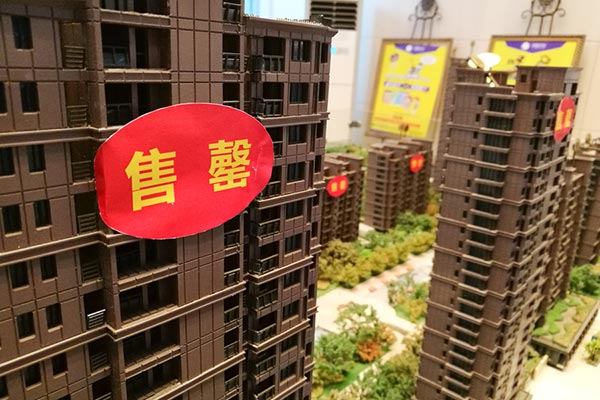Hangzhou moves to dampen hot housing market
(Xinhua) Updated: 2016-09-20 16:01
 |
|
Models of residential buildings are seen at a property showroom in Binjiang district of Hangzhou, Zhejiang province, Sept 14, 2016. The Chinese characters on the boards read "sold out". |
HANGZHOU - Hangzhou, a major city in eastern China, has followed several other first and second-tier Chinese cities and initiated measures to cool the housing market.
From Monday, people without a local hukou (household registration certificate) cannot buy a second home in the city.
The restriction is a far cry from two years ago when the city was attempting to pep up a stagnant property market by making access to housing easier.
"The policy is relatively mild and leaves room for further tightening," said Fang Zhangjie, head of research at property tracking website tmsf.com.
On Sunday, when the change was announced, many home purchases in the city were sealed late in the night, setting a daily sales record of 5,105 houses.
To curb speculation
Pang, a property speculator from Shanghai, rushed to Hangzhou on Sunday night to buy a second home.
"We didn't expect the rule change, so we had to sign the contract in a hurry," she said.
House prices in Hangzhou have risen 20 percent in the last year.
"The market in Hangzhou as a whole is healthy, but there have been signs of speculation," said Yu Xiaofen, head of the real estate research institute at Zhejiang University of Technology. "Excessive speculation raises the cost of living and starting a business. It reduces the city's allure and hurts its long-term prospects."
In August, one third of Hangzhou homes were sold to outsiders. In the week after the G20 Hangzhou summit the figure was closer to 40 percent, according to tmsf.com.
"The restriction may affect some non-residents, but many have already bought houses and received local hukou certificates along with them," said a local housing agent. "The policy may have some impact, but not much."
"The new homes inventory in Hangzhou is low, so the local government needs to sell land to put new homes on the market," said Jia Shenghua, head of Zhejiang University's real estate research center.
Feeding frenzy
"The new round of tightening in big cities is all about avoiding a property bubble," said Li Mingyan of Zhejiang Provincial Academy of Social Sciences.
Easy credit and low mortgage rates mean housing prices in big cities, such as Beijing and Shanghai, but also places like Xiamen, Hefei and Zhengzhou have been soaring for more than a year.
Of 70 cities surveyed, 64 reported new home price rises in August, up from 51 in July and 55 in June. But despite this, many are still rushing to buy.
Liu Cu, a Zhengzhou real estate agent, is surprised by the clamor to buy. "An old woman from Shanghai bought three apartments in Zhengzhou some months ago and has told me to reserve another three," he said.
In Beijing, prices of some homes have more than doubled over the past year, prompting glee in some quarters and groans in others.
Sales of resold homes in Beijing are currently rising by 16.5 percent month on month.
Xiao Yang has just bought a one-bed apartment in south Beijing after 18 months of indecision. "I could not afford the houses that I liked, so I waited and waited. As prices rose, my expectations had to fall," he said.
"Last year, the price was 43,000 yuan ($6,450) per square meter, and it was 58,000 yuan per square meter in August when I finally bought. Over the past three weeks, the price has risen by another 3,000 yuan. I need to borrow more from the bank."
More to follow
Ni Pengfei, a researcher with the Chinese Academy of Social Sciences, said despite downward economic pressure, more people were now optimistic about the housing market in big cities.
"This is rather an odd cycle as people from all walks of life have set their sights on the property market," Ni said.
Some buy on expectation of further price rises, and others buy because they fear if they do not move fast they will not be able to afford it in the future, said Zhang Dawei, an analyst with Centaline Property.
Zhang said the control measures will only have a slight impact if authorities do not tighten credit.
More cities may start to tighten in the future, and if these measures fail to cool the market even harsher measures can be expected, said Ding Zuyu, executive president for the research center of China Real Estate Information.
In the past few months, other cities such as Shanghai, Nanjing, Suzhou, Xiamen, Hefei and Zhengzhou have unveiled measures to cool the housing market, including purchase restrictions and higher downpayments.
"As more policies begin to take effect and purchasing power is depleted, housing sales might decline in the last few months of the year," Ding said.
- Alibaba-backed firm eyes scale
- Yuan settlement expands along the Belt and Road
- Premier gets down to business, meets executives in New York
- Lufthansa, Air China sign accord to operate European routes
- China moves to boost venture capital
- Push to boost trade growth to continue
- LeEco raises $1b to bankroll electric, networked sports car
- Steelmakers closer to creating mega mill

















